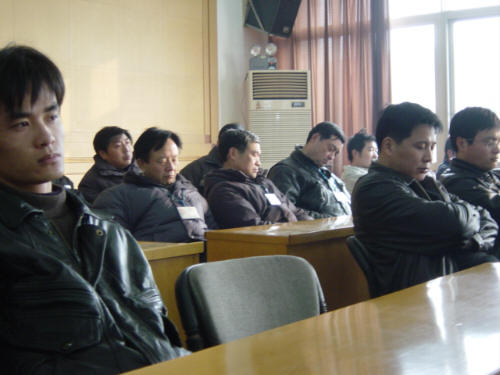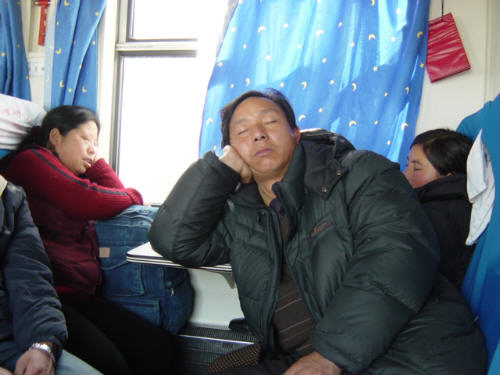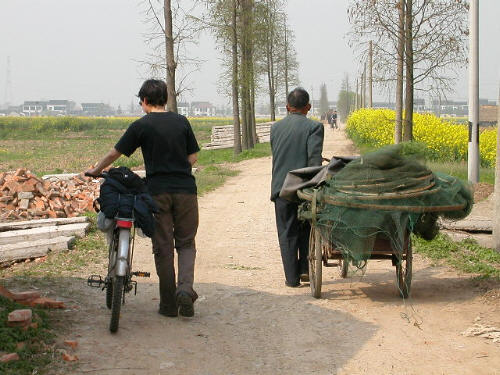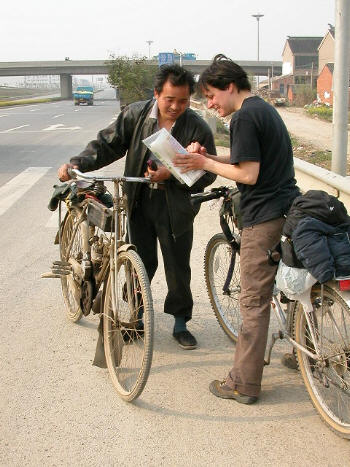Changzhou Chronicle Pt. 11
Goodbye China!
![]()
April 2004
Strange as it feels… the chapter China has come to an end. On the 9th of April, after struggling at the check-in to get 51kg of luggage through, I boarded the Shanghai-Munich flight and left China for good. The last weeks have seen a goodbye dinner after the other, but I spent my last 5 days on the road with Fred, cycling around Tai Hu Lake.
It’s sad to leave China… I left without completing my to-do list and without writing about many things (I was rather lazy lately, diary-wise). I will write about a couple of subjects in this last CC.
Probably not everyone knows about my recent decision to quit Fiat at the end of my Chinese posting and take a year off to travel. Of course, I’ll have a limited budget, but for once I will have the TIME to see things the way I like.
Next May I’ll be leaving on a one way ticket to New Zealand and from there… we’ll see. I have an itinerary in mind, but nothing is fixed. In August I will probably meet with Fred again in the Philippines, and I will spend some months cycling.
In any case, I will keep you posted.
Before leaving I will be in Berlin for a couple of days (11-13 May): I hope I’ll be able to see some of you!
All the best
Linda


Meeting Penichella in cantiere
 Venditore di piumini
Venditore di piumini
The Chinese and their Cellular Phones
One of the most striking things for a foreigner (even for an Italian!) in China is how cellular phones are widespread among the population. There are an incredible number of mobile phone shops and everybody who sleeps under a roof has one.
Even if the prices don’t seem to be very competitive, many people spend the salary of many months to buy the latest model. Many Chinese were shocked at the sight of my old Siemens!
But owning the newest mobile phone is not enough: you should also have a lucky number (the more 8s there are in it, the better), attach to your phone whatever kitsch accessory you find and choose the most incredible ringing tone, to blast at the loudest possible volume in any public place. If you have a child, one option is to record his/her voice and use it as a tone.
In any case, it’s fundamental to leave your phone ring for as long as possible.
In China you pay when you call, but also when you receive. That’s why everybody takes his/her time to check who is calling when the phone rings. If the call doesn’t seem to be important or the expense is likely to be high, then you can leave your phone ring indefinitely. Otherwise, you wait for 8-10 ring tones and then you position the phone near your mouth (totally unnecessary, given the circumstances) and you scream at the top of your lungs: “UEI!”.
A series of open sounds follows, interrupted by “Ahahahaha” sequences (demonstrating comprehension). Everything must happen at the highest possible volume.
Then, in the middle of what looks like a dialogue, you hang up.
Travelling by Train
Despite the vastness of its territory, in China you can rely on a good railway net, with the same standards from Xinjiang to Beijing, from Shanghai to Canton.
But before you can profit from the railway net, you must be able to get on the train.
The purchase of a train ticket can be an ordeal. Even after one year and a half of travelling in China, trying to buy a ticket I couldn’t be sure that I would exit the ticket hall with one.
There is a strong possibility that you encounter a woman employee who will answer all your questions with the unmerciful “MEI YOU” (lit. don’t have). Even more frustrating, the employee might have a button for the activation of a recorded negative message of which you won’t understand a word. The real meaning, though, will become evident very soon: “You’ll never get the ticket you want, so you’d better give up”.
There is a multitude of possible reasons for the MEI YOU: there could be no more seats, no more standing tickets, no first class tickets (for some reason many sellers think that foreigners only travel first class), the train could pass the station without stopping, or stop but without permission to board it, there could be no more tickets in this station, but maybe you could find some at the travel agency nearby. Even when every already mentioned possibility has been exhausted, there will always be some issue. Even the only English-speaking Chinese from the queue, who will have joined you out of compassion, will be unable to explain you the problem.
Once you finally get a ticket, you have to get on the train. This procedure is very slow and involves a lot of bureaucracy, but you should be able to survive without any major problems, provided you arrive at the station at least 30 minutes before the train is due.
They begin by checking your ticket to admit you inside the station, x-raying your luggage, checking your temperature, showing you the right waiting hall, calling the train, checking your ticket to admit you on the platform, checking your ticket to admit you on your car. When you finally find your seat, another person with exactly the same ticket might be seated there. After a little scene, usually the one who bought his ticket at the “unofficial” counter will look for another seat.
During the trip you have a handful of options: you can entertain half the car by exchanging a couple of sentences with your neighbours, you can observe the others eating the most peculiar snacks (chicken feet are one of the favourites), you can try to sleep in the most uncomfortable positions like the majority of the others, or you can let the official sellers entertain you. I noticed that the sock sellers are quite recurrent and that they give some of the best shows. They go out of their way to demonstrate how hard wearing the socks are: they use fire and nails. I once saw a guy passing a sock around the luggage rack and hanging with all his weight on it, to demonstrate the strength of the sock.
The concept of hygiene is quite interesting, too. Despite the fact that the car-chief is very busy with sweeping, emptying bins and cleaning, on long trips the floor will inevitably be covered with seeds, plastics, napkins, spits and in some cases even urine of the kids.
Ps: Despite everything, travelling by train is one of the best ways to see China. The night trains in particular are well equipped and comfortable.
Just be mindful of the distances (being stuck for 40 hours on a train is not very pleasant)!

The Last Trip: 5 Days Cycling Around Tai Hu (to see the pictures click here)
During my last Chinese week, I left on my last trip. No exotic destination, this time, but the 5 days in the countryside around Tai Hu haven’t been less interesting.
We left Changzhou with our bikes and a tent with the only goal of staying away from the traffic and the tourists.
We ended up cycling on countryside trails most of the time and sleeping in the tent in the fields. We would build up our tent at darkness fall and leave as soon as the sun came up, before the peasants got out to the fields. No one ever noticed our presence.

Apart from the cold of the first 2 nights (3°C and a lot of humidity), it was very pleasant to discover the countryside, the small villages, the yellow fields, the rural graves, the different production districts: some villages were completely devoted to terracotta craftware, others had a constant noise coming from the looms, working night and day…



Once out of Jiangsu and in Zhejiang, we had a very nice road right on the lake. The conditions of road/weather were ideal. We had to leave the lake in order to reach Tong Li, one of the Watertowns and from there we continued to Suzhou. We had one thing in mind: going back to Changzhou by boat, on the Imperial Channel.
For one and a half years, I had been seeing the traffic on the Channel every single day. There were no passenger boats, but being able to actually get on one of the cargo boats and navigate would be the best way to end my stay in Changzhou.
Near Suzhou, during the last night, we found some boats which had stopped for the night and with the help of a nice captain in his pyjamas we managed to find someone who would leave for Changzhou the next morning at 4:30. Great!
We had a very short night (at midnight we had to pack because of an approaching storm: Fred’s tent is not waterproof!) and we spent the last hours on a bench.
At 4:30 we were ready to sail: we spent the dawn in the boat cabin, watching the traffic of the Channel and passing Suzhou and Wuxi, all the way back to Changzhou.
| CC Part 10 | CC Index | The End | ||